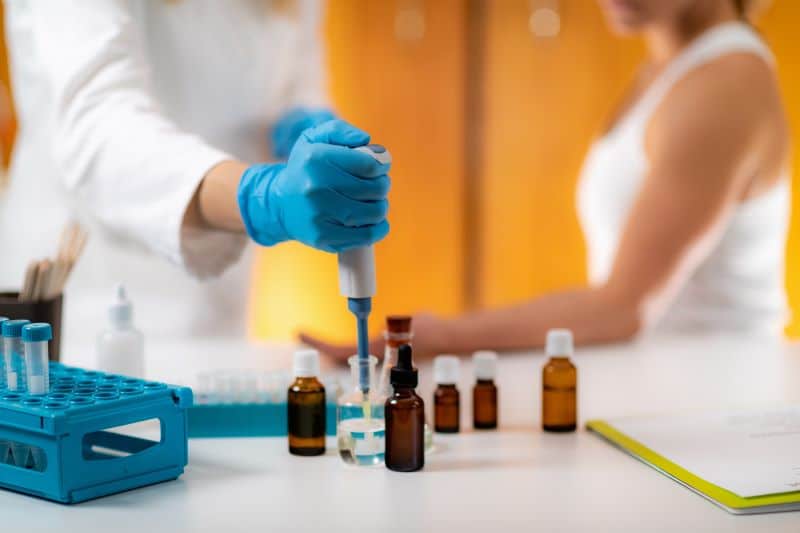The Drug Excipients Most Likely to Cause Allergic Reactions

While there is significant ongoing research into allergic reactions caused by active ingredients in medications, a related area that has received very little attention is allergic reactions caused by excipients used in medication.
Excipients are ingredients added to medication that have no therapeutical benefit. They are the extras, like colours, flavours, preservatives, stabilisers and fillers that don’t play no part in the pharmacological effect of the drug.
A literature review published in the Journal of Investigational Allergology and Clinical Immunology in 2019 explored cases of immediate hypersensitivity reactions (IHRs), or allergic reactions, to excipients that may lead to a false-positive diagnosis of drug allergy. The review focussed in IHR’s that were scientifically tested and known to have been caused by the excipient and no other ingredient in the drug or external cause.
Following is a list of the excipients the review found most likely to cause IHRs in the general population:
Analgesics
- Manitol – known to cause hypersensitivity reactions, particularly when combined with an artificial sweetener
- Povidonel – Known to cause anaphylaxis
Antibiotics
- Polyethylene Glycol (PEG) – sometimes called macrogol, this excipient has been known to cause episodes of urticaria (hives).
- Macrogel 6000 – known to cause urticaria (hives), tachycardia (rapid heartbeat), and dizziness after ingestion.
Dyspepsia (Indigestion) Medications
- Manitol – reports of anaphylaxis and not always listed on labels
- Macrogel 6000 – reports of anaphylaxis and urticaria (hives)
Corticosteroids
In a review of the literature, excipients were found to be responsible for 28.3% of the allergic reactions experienced by 106 people who took corticosteroids. The responsible excipients included Lactose (10 reactions) carboxymethylcellulose (CMC)(7 reactions) and PEG (5 reactions).
“Reactions induced by excipients contained in corticosteroid formulations, such as lactose and CMC, have been demonstrated by sIgE (allergy tests) to these excipients. In a recent study of 64 patients who underwent corticosteroid allergy testing, true allergy was confirmed in 9 patients (14%), 5 of whom had positive SPT or provocation test results. The patients were actually allergic to the excipients (CMC and PEG), thus highlighting the importance of an accurate diagnosis…”
Erythropoiesis-Stimulating Agents
- PS80 – Generalized pruritus, erythema, and orofacial angioedema after subcutaneous administration
Insulin
The prevalence of IHRs to insulin products is around 2%, and less than one-third of cases are related to insulin itself. Most reactions were due to the following excipients:
- Metacresol (erythema, urticaria, and eventual rapid skin breakdown)
- Protamine (generalized urticaria and facial angioedema, anaphylaxis)
- Zinc (Injection site reactions and generalized urticaria, facial edema and dyspnea).
Laxatives
- Macrogol 3350 – anaphylaxis during bowel preparation
- Macrogol 4000 – urticaria and angioedema and anaphylaxis episodes.
Nasal Decongestants
- Lysozyme – IHRs reported in a child whose diet did not include egg at the time of the reaction.
Nonsteroidal Anti-inflammatory Drugs
- Macrogols 4000 and 6000 – Reactions have been confirmed after nimesulide granules containing macrogol 4000 were taken in combination with paracetamol syrup (Tachipirina) containing Macrogol 6000.
- Yellow Dyes: Quinoline Yellow and Sunset Yellow (Cartia) – Several cases of urticaria have been reported after ingesting pills containing these kinds of dyes.
Ophthalmic (Eye) Products
- Benzalkonium Chloride – episodes were reported after the use of eye-drops and after receiving mydriatic drops
- Carboxymethylcellulose (CMC) – In one case CMC caused conjunctival erythema and bilateral periocular edema with urticarial lesions
- PVP – A patient developed periorbital swelling, angioedema of the tongue and lips, dyspnea with a sensation of nasal obstruction, and throat constriction.
Parenteral Medications
- Benzyl Alcohol (BnOH) – can cause sensitization and anaphylaxis both by contact and systemically.
Are excipients in all drugs?
Most manufactured medications will contain some kind of excipient; their purpose is to make the medication taste better, look better or last longer. Most of the time excipients serve a good purpose and do not affect a person’s health. However the only way to be sure your drug does not contain excipients is to have your medication compounded by a reputable compounding pharmacist.
Note from National Custom Compounding: We have over 20 years experience making personalised medication (compounded medication) free of potentially harmful excipients. We can safely make up medication in our Queensland laboratory, with the exact same active ingredients as the commercial drug, but without the added extras. For more information contact National Custom Compounding on 1300 731 755 or [email protected].
